“Ukraine’s economy survived the third year of the “great” war, although people had to tighten their belts – the government raised taxes, and prices rose like yeast. UNIAN summed up the economic results of the year and found out what to prepare wallets for in 2025.”, — write: www.unian.ua
The third year of the full-scale war is coming to an end, which proved to be difficult for the bleeding national economy, which, however, despite all the troubles, continues to stay afloat and even has a certain safety margin for the next year. But everything would be much worse if it were not for international aid from partners, at the expense of which all budget expenditures are financed, except for the military – the Ukrainians provide for the army independently.
But the personal finances of Ukrainians in 2024 became bad. If in 2023 inflation amounted to a little more than 5 percent, then this year the prices of all goods and services grew at a much faster pace, and citizens felt it in their wallets.
In addition, for the first time since the beginning of the full-scale invasion, the authorities resorted to raising taxes – since December, the military levy, which has been at the level of 1.5% of income since 2014, is 5%. It was also introduced for the first time for individual entrepreneurs – from January 1, 2025, FOPs of the third group will pay 1% of income, other groups – 10 percent of the minimum wage in Ukraine, which is 8,000 hryvnias and will not increase in 2025.
That is, living has become more expensive, incomes are also decreasing due to taxes, but what can we expect from next year? Will life become easier, or will the burden of impoverishment finally tighten around the neck of the Ukrainian? UNIAN collected the main macroeconomic results of 2024 and analyzed analysts’ forecasts for 2025 in order to find answers to these questions.
Economy-2024: GDP is growing, but Ukrainians do not feel itThe final results for 2024 have not yet been finalized, but it is already possible to draw certain conclusions with which indicators the national economy will enter the next year.
Last year, Ukraine’s economy grew by 5.3%, but given that in 2022 there was a drastic drop of almost a third, it was not so much about growth as about timid recovery. At the end of 2024, gross domestic product is expected to continue to grow, but at a slower pace than last year.
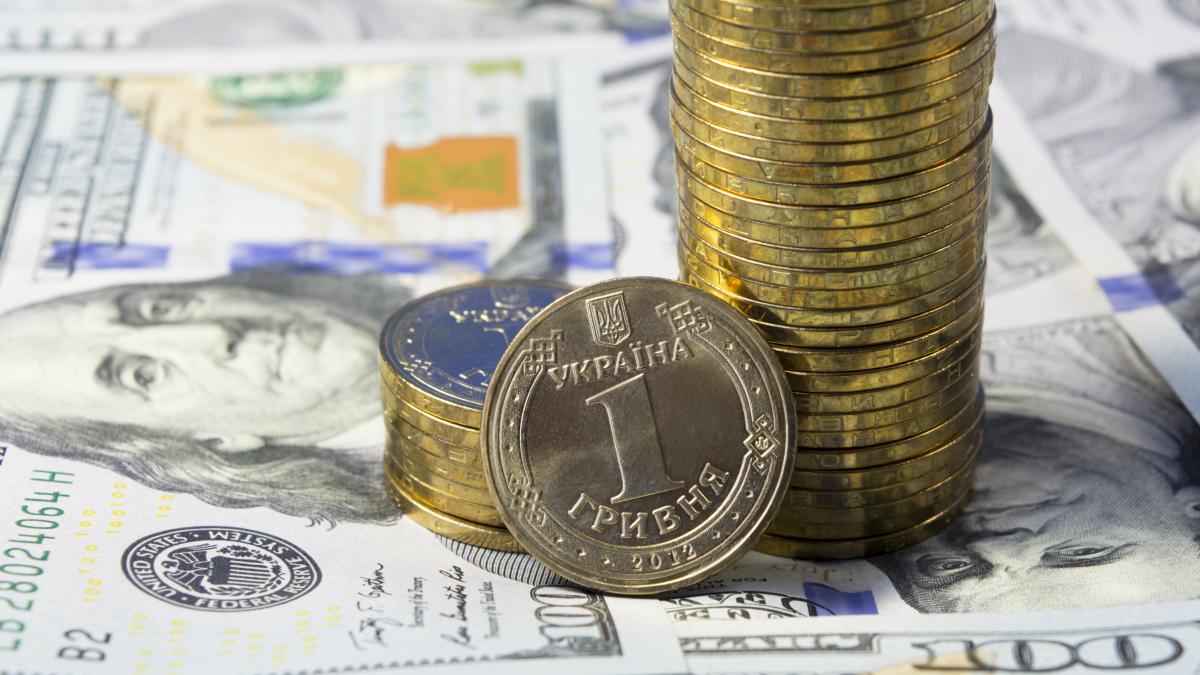 According to forecasts, GDP growth at the end of this year will be up to 4% / photo ua.depositphotos.comAccording to the Ministry of Economy, Ukraine’s GDP grew by 4% over the past 11 months. In November, in particular, growth slowed down to only 0.9 percent compared to the same month in 2023.
According to forecasts, GDP growth at the end of this year will be up to 4% / photo ua.depositphotos.comAccording to the Ministry of Economy, Ukraine’s GDP grew by 4% over the past 11 months. In November, in particular, growth slowed down to only 0.9 percent compared to the same month in 2023.
First Deputy Prime Minister – Minister of Economy Yuliya Svyridenko noted that the drivers of economic growth in 2024 will remain the transport and construction industries, processing and domestic trade.
“State support programs played their role – grant programs for processing, for business creation and development, affordable lending 5-7-9, “eOselya” and others within the framework of the “Made in Ukraine” policy. Also, the increase in purchases of Ukrainian defense and military products stimulates the growth of mechanical engineering “, said Svyridenko.
According to most forecasts, GDP growth at the end of this year will be up to 4 percent.
Thus, in the updated forecast, the National Bank improved expectations of economic growth (from 3.7% to 4%). The forecast of the Ministry of Economy is 3.5%.
The International Monetary Fund, on the other hand, is more cautious in its forecasts and gives only 3 percent. According to the fund, in the second half of 2024, economic growth in Ukraine will slow down due to the consequences of Russian attacks on energy infrastructure, the impact of the war on the labor market and the level of expectations of business activity.
We will find out what the final figure really will be at the beginning of 2025.
Other important macroeconomic indicators include consumer inflation, which accelerated significantly in 2024. In November, it increased to 11.2%, and during the last weeks, the price tags in supermarkets have repeatedly changed – of course, in the direction of growth.
Among food products, vegetables became the record holders (they rose in price by almost 63% over the year), the prices of butter and eggs also increased significantly – by 30.7% and 30.6%, respectively. At the same time, in November, the price increase for eggs amounted to 54.6% for the month.
 Prices for vegetables this year broke all records / photo ua.depositphotos.comFruit prices increased by almost a quarter over the year (by 24.7%). Milk went up in price by 16.6%, bread by 15.8%. Only sugar fell in price over the year – by a modest 3.6 percent.
Prices for vegetables this year broke all records / photo ua.depositphotos.comFruit prices increased by almost a quarter over the year (by 24.7%). Milk went up in price by 16.6%, bread by 15.8%. Only sugar fell in price over the year – by a modest 3.6 percent.
Among the main factors of price growth is the increase in the cost of production due to the increase in tariffs, logistics costs, and the devaluation of the national currency. In addition, the National Bank explains the rapid increase in the price of food products by lower-than-expected harvests of certain agricultural crops.
“The hot summer and autumn with long periods without precipitation had a negative impact on the yield, ripening time, quality and supply of a number of vegetables and fruits. As a result, the prices of borscht vegetables, cucumbers, and apples increased faster. There was also increased pressure on production costs, in particular on electricity for preservation of finished products in trade networks and warehouses,” the regulator explains.
The NBU warns that inflationary pressure will persist in the coming months due to a smaller supply of certain food products than last year, significant budget expenditures, high rates of wage growth (due to a shortage of personnel) and a shortage of electricity during the heating season.
The dollar is growing, and inflation and taxes “eat” salariesIn recent months, the dollar exchange rate in Ukraine has been constantly breaking records. During the year, there was a gradual devaluation of the national currency – from 38 hryvnias per dollar as of January 1 to almost 42 hryvnias now. In October 2023, the National Bank abolished the fixed exchange rate and introduced a regime of managed exchange rate flexibility instead. This means that the exchange rate of the hryvnia to the dollar is determined by operations on the interbank foreign exchange market, but the regulator monitors fluctuations and does not allow the exchange rate to decrease significantly or, on the contrary, increase.
The weakening of the hryvnia over the year was gradual, with fluctuations in different directions and repeated updating of the historical maximum of the dollar exchange rate. The last such record was reached by the American currency on December 18, when the dollar reached UAH 41.83 at the official exchange rate. On the cash market, it has already crossed the psychological mark of 42 hryvnias.
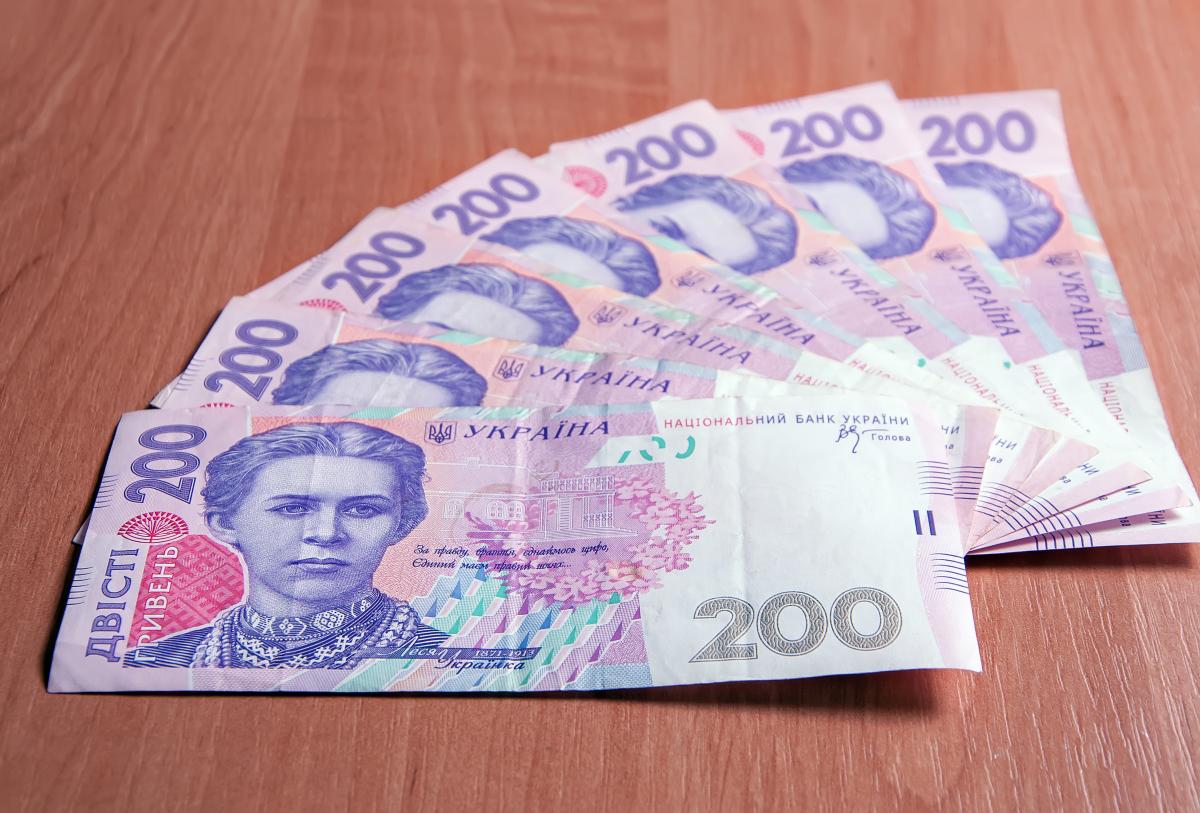 In 2024, the hryvnia weakened significantly / photo ua.depositphotos.comSuch a gradual weakening of the national currency is completely is included in the forecasts. For example, the Ministry of Economy laid a rate of UAH 42.1/dollar in the project of the state budget-2024. as of the end of the year, and as we can see, this forecast actually came true, although it is not necessary, because the forecast indicator is an estimate.
In 2024, the hryvnia weakened significantly / photo ua.depositphotos.comSuch a gradual weakening of the national currency is completely is included in the forecasts. For example, the Ministry of Economy laid a rate of UAH 42.1/dollar in the project of the state budget-2024. as of the end of the year, and as we can see, this forecast actually came true, although it is not necessary, because the forecast indicator is an estimate.
Currently, the gold and currency reserves of Ukraine are at a high level. Their growth was primarily facilitated by international financial aid. So, according to the latest data, in November reserves increased by 9 percent and amounted to 39.9 billion dollars.
As reported in the NBU, such dynamics were due, on the one hand, to significant volumes of income from international partners, and on the other hand, to a decrease in the volume of net sales of foreign currency by the regulator on the foreign exchange market.
Another important indicator of the economic condition is the wages of Ukrainians. The State Statistics Service recently pleased with the news that the average salary of full-time employees in Ukraine has increased by 22 percent since the beginning of the year, amounting to 20,592 hryvnias.
However, the department indicates the amount of salaries before deducting the personal income tax and the military levy, which has increased from 1.5% to 5% since December, and therefore the amount that citizens receive in their hands is significantly smaller. After deducting taxes, according to the State Statistics Service, the average salary “melts” to UAH 15,855.84, which is less than $380 at the current exchange rate.
Employers do increase the salaries of their employees, which is reflected in the statistics of the State Statistics Service. This is mainly due to the crisis in the labor market, when employers are forced to increase salaries in order to attract qualified specialists.
But, unfortunately, the majority of Ukrainians do not feel this growth, because the inflation mentioned above “eats up” almost all the increase. Therefore, at the current level of food prices and taxes, Ukrainians are unlikely to experience an improvement in their financial situation.
Between the hammer and the anvil: what to expect from 2025When making forecasts for the next year, most government officials, analysts and international organizations proceed from disappointing assumptions about the continuation of the active phase of the war during 2025.
The Ministry of Economy expects that GDP growth will slow down to 2.7% next year, and inflation will slow down to 9.5% near the end of the year (while it is currently 11.2%). Government officials set the dollar exchange rate in the state budget project for 2025 at the level of UAH 45/dollar.
The National Bank believes that in 2025 the growth of Ukraine’s real GDP will accelerate to 4.3%. And this is the most optimistic estimate among all available forecasts.
“This will be facilitated by the preservation of a soft fiscal policy, the revival of domestic demand, which will be supported by the growth of wages, increased harvests and stable external demand, as well as investments in recovery, in particular in the energy sector. However, economic growth will be restrained by the lack of labor force, security risks, migration processes and the slow normalization of economic conditions,” the regulator’s inflation report says.
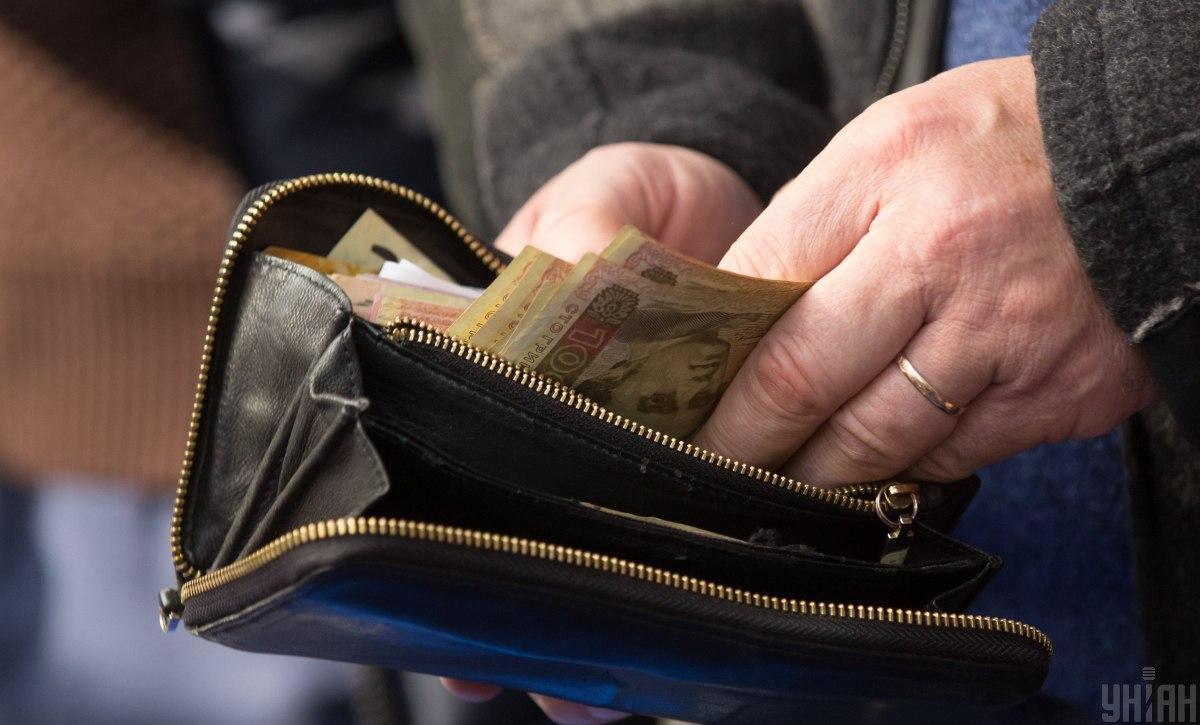 The restraining factors will affect the economic growth in the country, according to experts / UNIAN photoThe NBU also predicts a noticeable slowdown in inflation to 6.9% by the end of the year.
The restraining factors will affect the economic growth in the country, according to experts / UNIAN photoThe NBU also predicts a noticeable slowdown in inflation to 6.9% by the end of the year.
Traditionally, international organizations are much more cautious in their assessments and give less cheerful numbers. Thus, the International Monetary Fund expects that in 2025 the growth of Ukraine’s GDP will be 2.5%. The fund forecasts inflation at the level of 7.5%, and the dollar exchange rate at 45 UAH/dollar. It should be noted that the IMF has downgraded its previous forecast for economic growth, in which it expected GDP to increase by 6.5%.
“The figures were affected by the extraordinary bombings of the power system… As for 2025, this reflects the fact that the Russian war is ongoing. Earlier we predicted that it would end, but this is not happening, and this means new losses for the economy of Ukraine,” he commented on the deterioration of the forecast head of the European Department of the IMF, Alfred Kammer.
The forecasts of the international agency Fitch Ratings are similar to those given by the IMF. Although, according to their estimates, price growth in Ukraine in 2025 will be higher and will amount to 9.3% on average.
“Although Ukraine has demonstrated resilience and the ability to adapt to the war, we forecast a slowdown in growth to 2.9% in 2025 due to labor and electricity shortages,” the agency said.
The World Bank, in turn, does not radiate optimism either: the institution believes that significant damage from the Russian invasion and large-scale power outages will likely slow Ukraine’s GDP growth to 2% next year.
Partners will not leave us?Experts agree that in 2025, Ukraine will continue to receive international financial aid, which will cover the budget deficit.
The investment company Dragon Capital notes that the package of financial assistance of the G7 countries in the amount of $50 billion, guaranteed by the profits from frozen Russian sovereign assets (ERA), will allow to ensure the stability of the economy and continue resistance to the aggressor, even if military aid is reduced by partners. At the same time, Ukraine will have the opportunity to use the funds for both economic and military expenses.
“The government can count on $38 billion in external financing of the budget deficit in 2025, on par with the current year. Of this amount, 12.5 billion euros will come from the previously approved 4-year support program from the EU Ukraine Facility, $2.7 billion from the IMF within the framework of the EFF program, and the rest – about $21 billion – can be obtained from the ERA package,” the company’s macro forecast says.
It is important that financing within the framework of the ERA will not create an additional debt burden for Ukraine, although they may formally be considered as a loan.
Analysts draw attention to the fact that Ukraine will have additional financial resources for the purchase of weapons, which can become an important factor in the event of a reduction or stoppage of military aid from the United States. And if American support continues, the government will be able to direct additional funds to the development of the domestic military industry.
 American aid is very important for Ukraine / photo ua.depositphotos.comThe head of the macroeconomic research department of the ICU group, Vitaly Vavryshchuk, also believes that the financial assistance that Ukraine’s partners have pledged to provide in 2025 will be enough to guarantee macroeconomic stability.
American aid is very important for Ukraine / photo ua.depositphotos.comThe head of the macroeconomic research department of the ICU group, Vitaly Vavryshchuk, also believes that the financial assistance that Ukraine’s partners have pledged to provide in 2025 will be enough to guarantee macroeconomic stability.
“So business and the population will mostly not have to deal with significant economic challenges. This financial assistance next year will already be largely financed by income from immobilized Russian assets,” the expert noted.
And this means that at least the next year our economy will survive even more or less peacefully.
Analysts are cautiously optimisticExperts’ expectations for 2025 are, in general, positive, but all analysts proceed from the assumption that, unfortunately, military operations in Ukraine will continue.
IN Dragon Capital forecasts that real GDP will grow by 3% in 2025 thanks to a gradual recovery in domestic consumption and the development of the military industry, but shortages in electricity and labor will continue to hold back growth.
“Assuming that domestic electricity production will remain at the level of August-September due to the strengthening of PPO and repairs, and taking into account the expected increase in imported capacity, we estimate that the shortfall of electricity in winter will be relatively moderate and will amount to about 15% of demand (at the level of July 2024 ) and will decrease to 6-8% in 2-3 quarters of 2025. At the same time, imbalances in the labor market will remain significant against the background of mobilization to the Armed Forces and will continue to push up salaries,” the company’s macro forecast says.
On the inflation front, Dragon Capital expects underlying inflationary pressures to ease gradually as energy prices for industrial consumers stabilize. According to their estimates, consumer inflation will reach a peak of 11% in April-May 2025 and decrease to 6.3% by the end of the year.
Analysts estimate the average annual exchange rate in 2025 at the level of UAH 43/dollar. and predict a weakening of the exchange rate to UAH 45/dollar. until the end of 2025.
In the ICU investment group, the next year is considered a year of great hopes and hopes for the improvement of the security situation. However, analysts do not expect this to happen quickly.
Vitaliy Vavryshchuk, head of the macroeconomic research department of the ICU group, believes that economic growth will weaken and will amount to 3.4% by the end of 2025.
“Inflation has surprised us unpleasantly in recent months, but we see good conditions for its slowdown to the level of 7% at the end of next year. This means that the NBU will be able to move to the easing of monetary policy in the second half of 2025,” the expert adds.
According to the ICU forecast, the hryvnia exchange rate may weaken to UAH 45.7/dollar by the end of 2025.
“Now we do not see the desire of the NBU to significantly weaken the hryvnia exchange rate in the near future. However, after the slowdown of inflation in the second half of 2024, the NBU may be more open to a moderate devaluation of the hryvnia. In any case, according to the base scenario, it can be guaranteed that the rates of devaluation of the hryvnia next year will exceed 10%,” Vavryshchuk says.
The investment company Concorde Capital predicts the growth of the Ukrainian economy in 2025 at the level of 3.8%, the dollar exchange rate – 46 hryvnias at the end of the year (43.6 hryvnias/dollar on average) and average annual inflation of 9.9% with a decrease to 6 .8% at the end of the year.
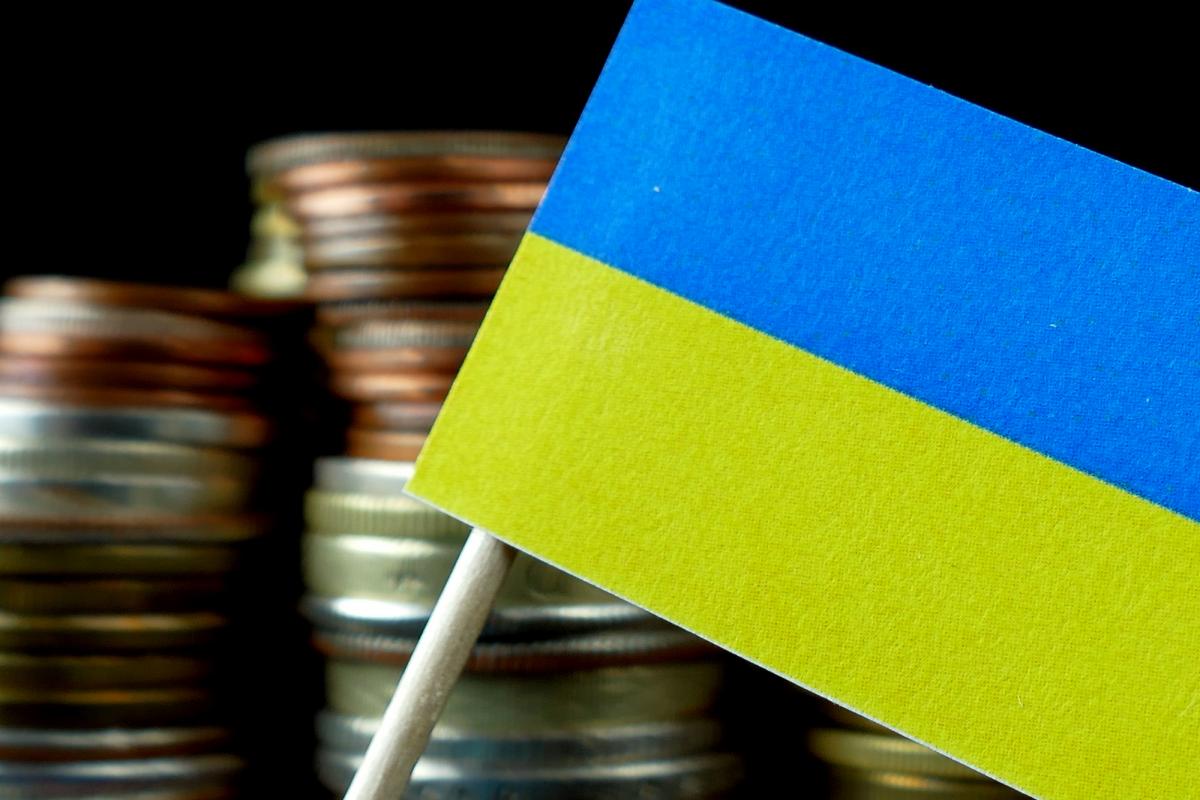 Because of the war, it is difficult to predict what stage the Ukrainian economy will be at / photo ua.depositphotos.comAt the same time, the head of the analytical department of the investment company Concorde Capital, Oleksandr Parashchyi, notes that it is now very difficult to predict how the Ukrainian economy will develop if the active phase of hostilities ends in 2025.
Because of the war, it is difficult to predict what stage the Ukrainian economy will be at / photo ua.depositphotos.comAt the same time, the head of the analytical department of the investment company Concorde Capital, Oleksandr Parashchyi, notes that it is now very difficult to predict how the Ukrainian economy will develop if the active phase of hostilities ends in 2025.
“Since, on the one hand, it reduces risks and can give an impetus to investments, on the other hand, most likely, the state budget expenditures will decrease. Accordingly, the consumer stimulus for the economy may decrease, including due to a decrease in the relatively high salaries of the military. This can even for a while to drive Ukraine into a certain crisis due to a decrease in demand,” the analyst noted.
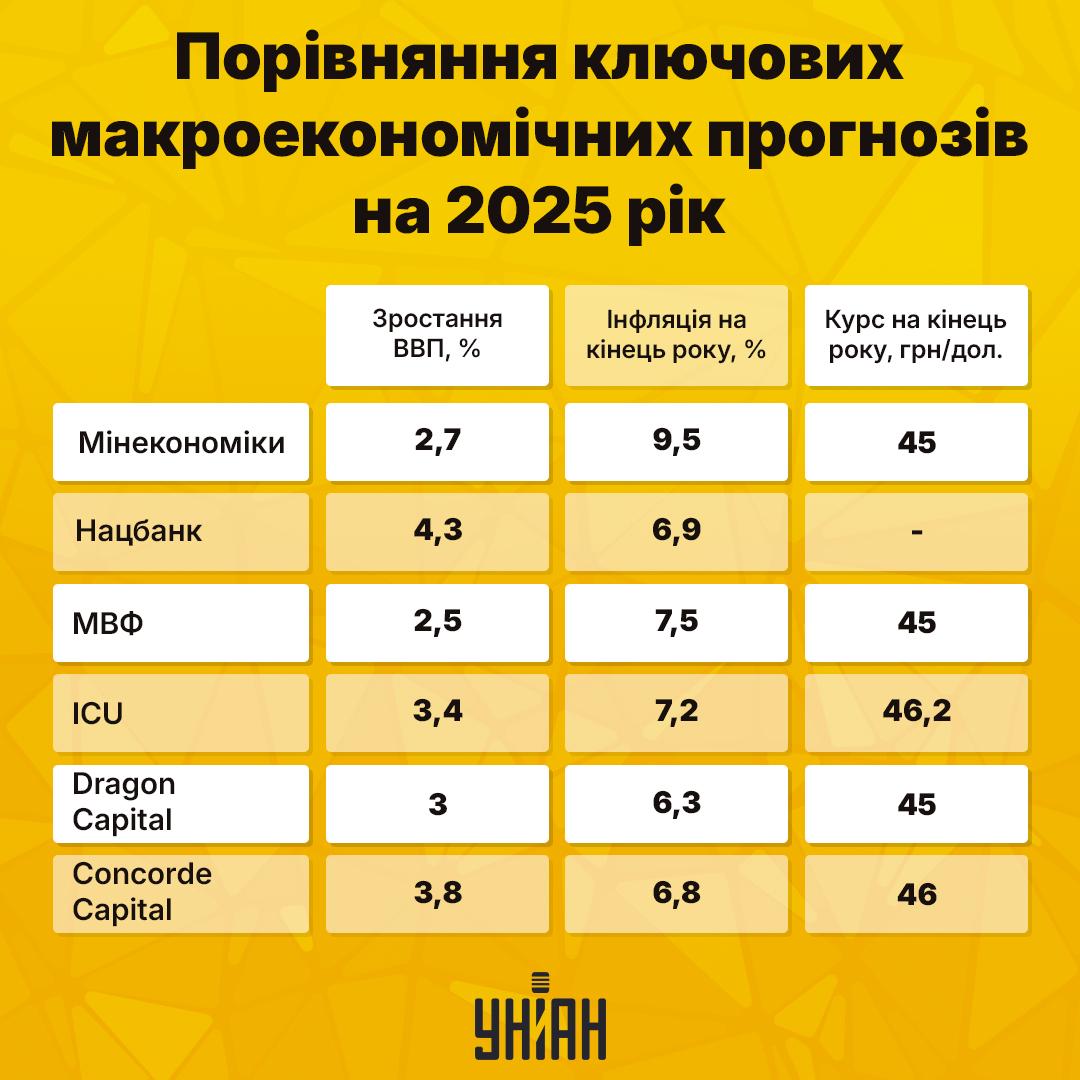 Comparison of key macroeconomic forecasts for 2025 / UNIAN infographicAccording to the above forecasts, the situation in the economy next year will resemble what we see now – a modest recovery of the economy, which will be even slower than this year, further devaluation of the hryvnia and an increase in wages against the background of a shortage of personnel (which will also continue to be “eaten” by inflation ).
Comparison of key macroeconomic forecasts for 2025 / UNIAN infographicAccording to the above forecasts, the situation in the economy next year will resemble what we see now – a modest recovery of the economy, which will be even slower than this year, further devaluation of the hryvnia and an increase in wages against the background of a shortage of personnel (which will also continue to be “eaten” by inflation ).
The good news is that analysts expect a slowdown in price growth. However, real inflation in 2024 turned out to be higher than forecasts (at the end of 2023, experts expected it to be up to 10%). So whether the optimism of specialists will be justified next year – time will tell.
Kateryna Zhiry
